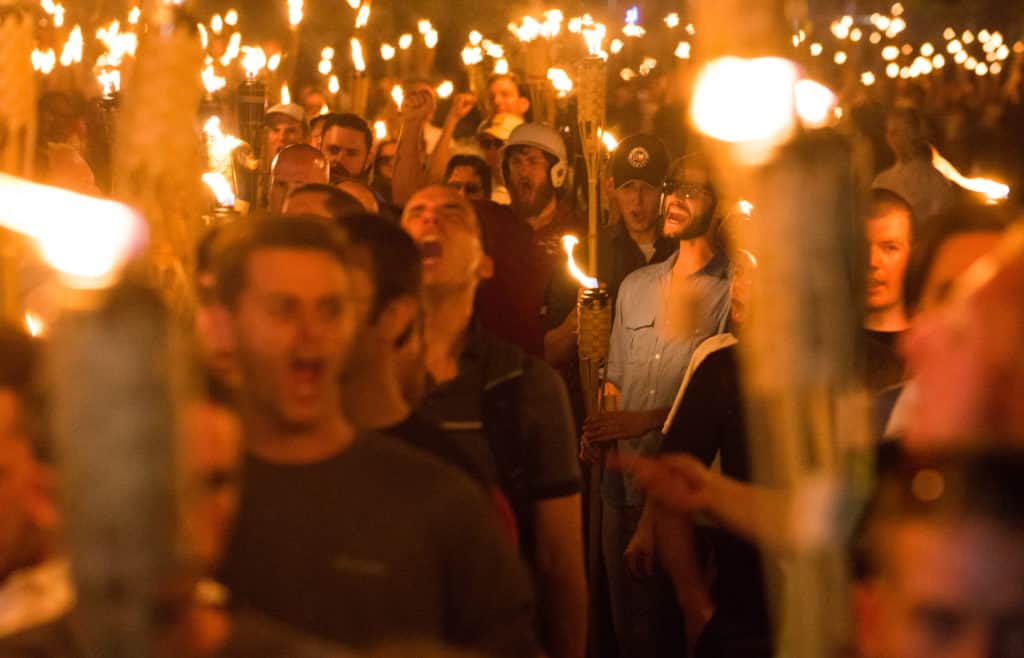Charlottesville and the Rise of White Identity Politics
Perry Bacon Jr., Five Thirty Eight, August 14, 2017

August 11, 2017 – Charlottesville, Virginia – Alt-Rightists march the night before the ‘Unite the Right’ rally, through the University of Virginia. (Credit Image: © Zach D Roberts/NurPhoto via ZUMA Press)
There is nothing new about white supremacist groups in the U.S., or anti-Semitism, or people who defend the symbols of the Confederacy. (The “Unite the Right” rally in Charlottesville, Virginia, was to protest the planned removal of a statue of Confederate General Robert E. Lee.) From Richard Nixon’s “law and order” platform to Ronald Reagan’s invocation of the “welfare queen,” presidents (mostly Republican, at least in recent decades) have regularly appealed to white, conservative-leaning voters by playing up fears and stereotypes about African-Americans and other minority groups.
What is different about this iteration of white nationalism is how the movement is framing its ideas, and the place those ideas occupy in U.S. politics. One of the chants white nationalists repeatedly turned to as they marched in Charlottesville on Friday night and Saturday was “white lives matter” — a direct response to the “Black Lives Matter” movement that emerged after the killing of Michael Brown by Ferguson, Missouri, police in August 2014 and the resulting protests.
That context is important to understand this moment in American politics — the events in Charlottesville and the “alt-right” generally. There are two competing narratives about race and racism at the center of today’s discussions. One perspective — most directly expressed by Black Lives Matter activists but also shared by many Democratic politicians, the media and other elite institutions — is that a “Black Lives Matter” movement is necessary because, by a lot of metrics, America has left blacks behind.
{snip}
To those who agree with the Black Lives Matter narrative, America doesn’t need a White Lives Matter movement because it already values white lives.
The Black Lives Matter movement is also part of a broader push on the left for promoting gender equality, expanding rights for gay and transgender Americans and ensuring workplaces and universities have more “diversity.”
{snip}
The competing narrative, one expressed mainly by conservatives, is that “Black Lives Matter” is essentially a liberal political movement like any other, and not a reflection of real, structural discrimination or inequality.
{snip}
Polls have found that Republicans are more likely than Democrats and the public overall to see whites and Christians as facing high levels of discrimination. Republicans, meanwhile, also perceive less discrimination towards blacks and Muslims than other Americans do.
And in my own conversations with some conservative activists after Black Lives Matter emerged, there was confusion about why exactly America needed a movement to improve the lives of black people. If you’re a white man in your 20s or 30s, as many of the Charlottesville protesters appeared to be, a list of the dominant American culture icons of your lifetime might start with Oprah, Beyoncé, Lebron James and Serena Williams. And it isn’t just culture: A black man, Barack Obama, has served as president, and African-Americans have led institutions from the State Department to McDonald’s.
{snip}
Blacks literally have (or have had) some of the most coveted jobs in America.
It’s easier for many whites to convince themselves that the problem isn’t racism, it’s “reverse racism.” (Affirmative action, which gives African-Americans and other minority groups an advantage in college admissions, hiring and other areas, comes under particular fire from many conservatives.) This strain of white identity politics, which sees white people as the group in need of special protection, is relatively new. In 2005, 6 percent of both Republicans and Democrats thought white Americans experienced “a great deal” of discrimination, according to a Pew Research Center survey. In 2016, the share of Republicans had jumped to 18 percent, while Democrats ticked up only slightly to 9 percent. Forty-nine percent of Republicans — compared to just 29 percent of Democrats — said whites face at least “some” discrimination.
{snip}















